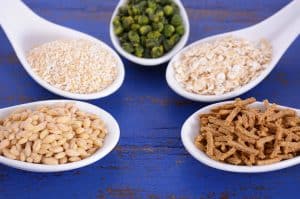A new Australian study reports that eating a healthy, balanced diet of fruits and vegetables may be the natural key to treating depression.
 The study, published in PLOS ONE, looked at young adults who had unhealthy diets and a significant amount of depression symptoms. According to the results, the young adults who began eating healthier foods later reported to have less anxiety and depression symptoms within a few weeks.
The study, published in PLOS ONE, looked at young adults who had unhealthy diets and a significant amount of depression symptoms. According to the results, the young adults who began eating healthier foods later reported to have less anxiety and depression symptoms within a few weeks.
The study’s lead author, Heather Francis, is a lecturer in neuropsychology at Macquarie University in Sydney, Australia. She believes that the study has provided clear evidence that diets filled with processed foods can lead to mental health issues like anxiety and depression.
This particular study involved 76 university students between ages 17 and 35. Every student involved in the study was known to have a diet high in unhealthy fats, sugars, and processed foods. They also stated feeling sad with a lack of both pleasure and motivation.
 Several of the students in the study changed their diets for three weeks, committing to eating much healthier foods and cutting out the bad ones. Those who did stated that their depression symptoms significantly decreased. They also felt less anxious. The students who remained on their regular unhealthy diet reported that their mental health symptoms stayed in the “moderate to high” levels.
Several of the students in the study changed their diets for three weeks, committing to eating much healthier foods and cutting out the bad ones. Those who did stated that their depression symptoms significantly decreased. They also felt less anxious. The students who remained on their regular unhealthy diet reported that their mental health symptoms stayed in the “moderate to high” levels.
What are the benefits of this small study?
The study on healthy eating and depression may be small, but it gives us a very simple takeaway: changing your diet may be a way to improve mental health. Focusing on proper nutrition will contribute to your overall health anyway, but if you struggle with mood issues, you may end up reaping several benefits.
How might healthy eating change your mood?
Francis explains that depression and anxiety are actually connected to a chronic inflammatory response in the diet. Eating a poor diet exacerbates that inflammation and thus creates more of a possibility of depression.
The findings of her study also correlate to another one performed earlier in the year by researchers at the University of Alabama at Birmingham. The results, published in Physiological Reports, showed that diets high in sodium and low in potassium could lead to depression in teenagers.
The lead author of this the study was Sylvie Mrug, professor and chair of the psychology department at UAB. She said that because young teenagers’ emotions are still in the developmental phases, diet and environmental factors could affect their depression levels very much.
 We can’t control all aspects of our life, Mrug notes. But we usually have a good deal of control over we eat, so we might as well try to eat healthier. Even if you aren’t ready for or able to do a complete diet overhaul, start with some simple changes. Incorporating more fruits and vegetables into your diet is a great start. Ditching foods that are high in sugar and unhealthy fats is another. To utilize the findings of Mrug’s study, it may be a good idea to increase your potassium intake and lower your sodium intake.
We can’t control all aspects of our life, Mrug notes. But we usually have a good deal of control over we eat, so we might as well try to eat healthier. Even if you aren’t ready for or able to do a complete diet overhaul, start with some simple changes. Incorporating more fruits and vegetables into your diet is a great start. Ditching foods that are high in sugar and unhealthy fats is another. To utilize the findings of Mrug’s study, it may be a good idea to increase your potassium intake and lower your sodium intake.
Both of these studies show the possibility for a natural treatment to reduce depression and anxiety symptoms. But the researchers state that healthy eating alone may not be a suitable treatment for everyone and should never replace medication unless under the direction of a doctor.
Francis plans to conduct larger studies on the topic that may provide more insights.


























